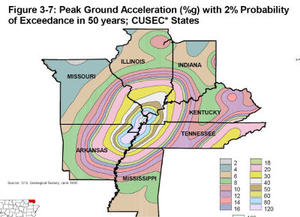Officials to Emit Seismic Tests Near California Nuclear Plant
Officials Mull Seismic Tests Near California Nuke Plant
"I am very concerned about impacts to marine mammals, especially some of the large whales including blue, fin, and humpback whales," said John Calambokidis, an Olympia, Wash.-based marine biologist who has studied Pacific Ocean whales for decades. "There are many uncertainties on the impact of this type of operation on whales, especially since we have not seen this type of large air gun survey off California for a long time."
"People need to understand, we're living in the world post-Fukushima, so we need to go back and review everything we think we know about the seismic threat situation around important structures like this power plant," said Bruce Gibson, a former seismologist who now serves as a San Luis Obispo County supervisor.
"Unfortunately, from an environmental impact standpoint, the only real way to get the images is to put high energy sound into the earth."If the project gains approval from myriad agencies, scientists would tow up to 18 air guns behind a boat and blast loud sound into the water over a 530-square-nautical-mile area. Hundreds of sensors would be placed strategically on the seafloor, picking up the reverberations and allowing computers to create three-dimensional maps in technology similar to an ultrasound.
The air guns and sensors would be dragged through an area that includes two state marine protected areas — Cambria and White Rock — and is adjacent to the Monterey Bay National Marine Sanctuary. Dozens of endangered and threatened species use these waters.
A similar seismic survey is being planned near the state's other nuclear plant at San Onofre, in San Diego County to the south.
A State Lands Commission environmental impact study found on Aug. 20 there would be "unavoidable impacts" to marine life in the area during the San Luis Obispo testing.
But the commission also concluded the "benefit of the project outweighs the unavoidable adverse impacts," said Jennifer DeLeon, a senior environmental scientist at the commission.
While similar high energy seismic surveys have been done on the Pacific Coast — most recently off Washington — PG&E said monitors there did not observe harm to whales or other marine mammals.
The powerful cannons used in these projects can be fatal to animals that stray too close to them. Also, biologists said the loud noises could drive migrating whales and their calves apart, and that mortally wounded whales often sink in the ocean, so it is difficult to see how the tests affect the creatures.
Efforts to mitigate such impacts will reduce, but not eliminate, harm to animals, according to the company and earth scientists.
"The sound source for the PG&E imaging project is a type that has been used for several decades by scientists and industry," Donna Blackman, a geophysicist at Scripps Institution of Oceanography in San Diego, said in an email. "Known cases of possible impacts on marine mammals are very few. An integral part of using this type of system is to have continuous monitoring for whales within close range of the ship."
"If the ship is coming within 1.1 mile of any mammal, not just a marine or listed, but any mammal, we have to shut down," Krausse told the California Fish and Game Commission on Monday.
Related:"The marine protected areas were created (so) marine wildlife could thrive without human interference," said Amanda Wallner of Sierra Club California. "We share concern over earthquake risk at Diablo Canyon. However, we don't believe this is the best way or the only way to determine seismic risks."
Most U.S. nuclear plants are on an ocean or one of the Great Lakes or have closed-loop cooling systems that don’t rely as much upon water from nearby rivers or lakes.

There are 104 nuclear plants in the United States, and fifteen of them are located in what is known as the New Madrid Seismic Zone, a region defined by a fault line of the same name.
Source



